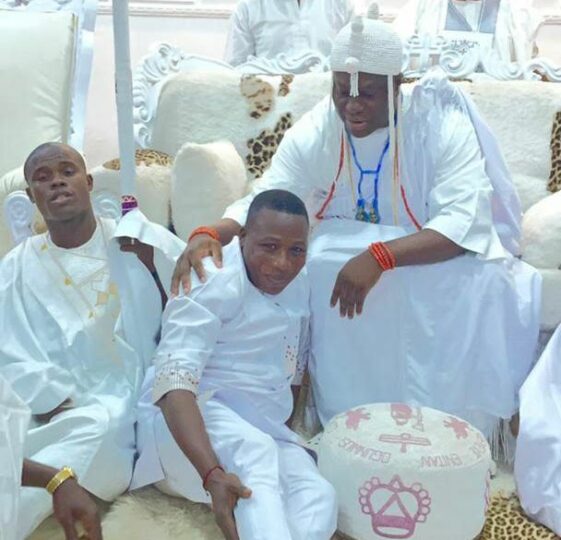
Sunday Igboho Sparks Debate Over Yoruba Crown During Visit to Ooni of Ife

The ancient halls of Ile-Ife echoed with tension and tradition as Yoruba activist Sunday Adeyemo, popularly known as Sunday Igboho, stood before the Ooni of Ife, one of the most revered monarchs in Yorubaland.
What was meant to be a reconciliatory visit soon took on a deeper layer of controversy when Igboho, addressing a crowd during the meeting, made a startling claim about the Alaafin’s crown.
In words that quickly sent ripples across Yoruba social and political circles, Igboho declared that the Alaafin’s crown originally belonged to his father before being given to the Alaafin, igniting a fresh debate over lineage, heritage, and the legitimacy of Yoruba traditional authority.
The comment, though brief, struck a nerve in a culture where crowns are more than ornaments. Within Yoruba society, a crown represents the soul of kingship, the embodiment of divine authority, and a tangible link to ancestral power.
To question its ownership is to reopen old wounds about legitimacy, succession, and the very foundation of rulership. Igboho’s statement did exactly that, casting a shadow over the gathering and reminding listeners that the politics of tradition is as fierce as the politics of state.
Historians have long warned of the fragile balance within Yoruba traditional rulership.
The Wikipedia entry on the rulers of Oyo, for example, notes how the early history of the Alaafin dynasty is riddled with speculation, discrepancies, and gaps in recorded reigns.
These ambiguities provide fertile ground for claims and counterclaims, with rival lineages sometimes asserting rights over regalia, thrones, and titles.
What Igboho invoked was not just personal heritage but a wider history of disputes where crowns, sceptres, and stools are more than symbols—they are weapons in struggles of power, identity, and legitimacy.
Yet this was not a day designed for confrontation. Reports from The Eagle Online revealed that Igboho’s visit to the Ooni was part of a broader effort at reconciliation.
Known for his fiery activism, particularly during clashes with authorities over Yoruba self-determination, Igboho had in the past exchanged heated words with traditional rulers, including the Ooni himself. His appearance in Ile-Ife carried the weight of humility, as he offered apologies for past grievances and sought forgiveness in line with Yoruba cultural practices where public contrition is often required to mend broken ties.
That is what makes his crown comment all the more complex. On one hand, it was a day of peace-making, where an activist knelt before tradition to be absolved. On the other, it became a day of reminder that beneath the gestures of respect lies a simmering cauldron of historical rivalries. In Yoruba culture, an apology is sacred, a symbolic restoration of harmony, but the simultaneous assertion of contested lineage reveals the paradox of Yoruba politics—where respect and rivalry can coexist in the same breath.
For observers, the scene was emblematic of Yoruba society’s layered identity. Here was Igboho, the son of Oke-Ogun soil, standing before the Arole Oduduwa, apologizing yet asserting, bowing yet contesting, reconciling yet reigniting. It is a dance as old as Yoruba civilization itself—where kings and warriors, activists and rulers, navigate the thin line between deference to authority and defense of heritage.
The implications of his words are already being dissected. For some, Igboho’s statement is nothing more than a personal anecdote, a family tradition brought to light in an emotional moment. For others, it is a deliberate reminder of unresolved historical questions that continue to shape the legitimacy of crowns in Yoruba land. In a region where the authority of rulers rests on ancestral claims, such remarks cannot be dismissed as harmless. They carry weight, reverberating through palaces and council halls, sparking whispers of “what if” and “what could have been.”
Still, the day was ultimately one of reconciliation. Eyewitnesses described the Ooni of Ife as gracious, receiving Igboho’s apology with calm authority, reaffirming his role as custodian of Yoruba unity. In a society where public forgiveness is as important as public offense, the meeting served as a reminder that traditional institutions, despite their controversies, remain pillars of mediation and balance. Igboho’s humility, coupled with his sharp assertion, encapsulated the duality of Yoruba activism—respect for culture alongside a relentless push for truth as one sees it.
As the dust settles on his visit, one thing is clear: Sunday Igboho has once again stirred the pot, weaving his personal narrative into the larger fabric of Yoruba history.
His apology may have mended fences, but his claim about the crown ensures that conversations about legitimacy and authority will continue in hushed tones across Yorubaland. The story of crowns, after all, is never settled. It is passed from generation to generation, argued in family compounds, whispered in the halls of power, and occasionally, spoken out loud in the presence of kings.
In the end, the day in Ile-Ife was not just about one man seeking forgiveness. It was about the eternal dance of power and tradition, of heritage and humility, of crowns and claims.
Sunday Igboho walked into the palace of the Ooni with bowed head and unbowed conviction, leaving behind a narrative that will linger long after the applause and murmurs faded. In Yorubaland, where the crown is life itself, his words ensured that the debate over who truly owns it remains alive—and perhaps that was his intention all along.
Watch the video below
“Alaafin has no crown, it was my father's crown they collected and dashed Alaafin” - Sunday Igboho says during his visit to Ooni of Ife. pic.twitter.com/akEvC8MHDu
— Harry Da Diegot (@trigottista) August 24, 2025


